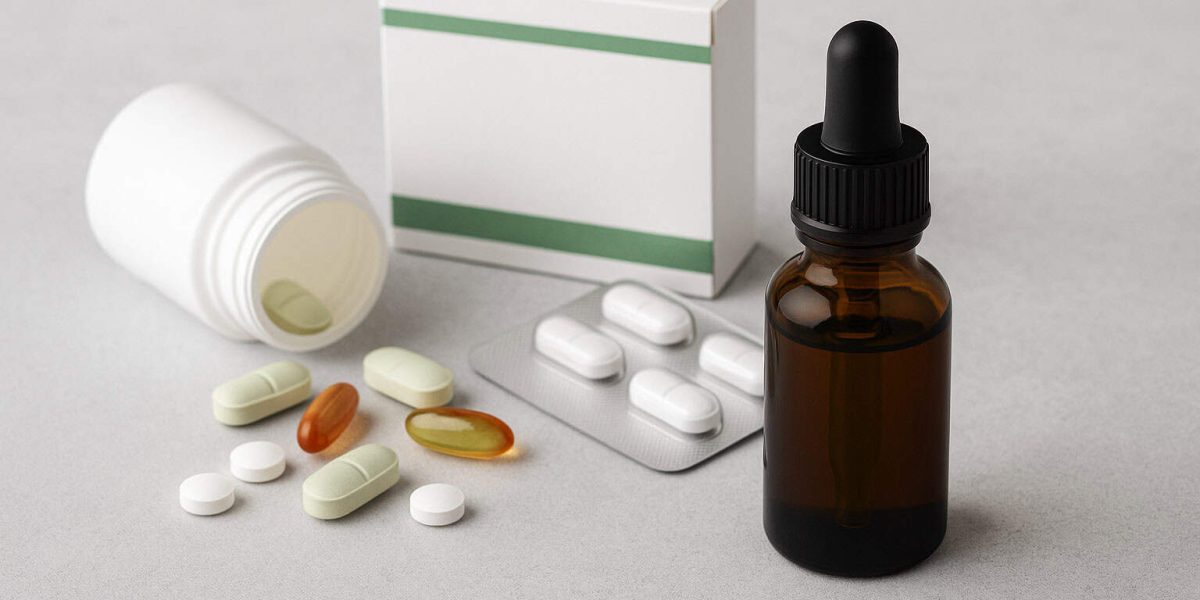The popularity of CBD is growing steadily in the Netherlands, and we at Dutch Balance regularly get asked if CBD is safe to use alongside medications. It’s an important question because although CBD is a natural dietary supplement, it doesn’t automatically mean it won’t affect other drugs you take. Research shows that as many as 81% of people who use herbal remedies combine it with medication, often without fully understanding the potential risks.
In this article, we explain what you need to know about possible interactions between CBD and medications so you can make an informed choice. Because safety is always our top priority.
What are interactions anyway?
An interaction occurs when two drugs affect each other in your body. This can mean that a drug works less well, works stronger than intended, or that unexpected side effects occur. As the CBG (College ter Beoordeling van Geneesmiddelen) explains it: a drug may “suddenly work less or stronger” as a result, and “side effects may also occur.”
With CBD, this happens mainly because the substance is broken down by the same enzymes in the liver that also process many drugs. This system is called the cytochrome P450 system. Just as grapefruit juice is known to affect certain medications, CBD can also inhibit these enzymes. As a result, medications can stay in your body longer or be broken down faster than normal.
Medications that require extra attention
Blood thinners
Blood thinners such as warfarin are among the riskiest combinations with CBD. Researchers at Harvard Medical School specifically warn against this combination. CBD can cause blood thinners to stay in your body longer, increasing the risk of bleeding.
Signs to watch for include unexplained bruising, having a nosebleed more often than usual, bleeding for a long time at small cuts, or bleeding from the gums. Do you notice any of these things? If so, contact your doctor right away.
Heart and blood pressure medication
CBD can enhance the effects of blood pressure-lowering medications. Research shows that especially the heart rhythm drug amiodarone and thyroid medication such as levothyroxine can cause problems.
This may cause a sudden drop in your blood pressure, dizziness or cause you to faint. Are you taking heart or blood pressure medication? Then it is extra important to check your blood pressure regularly, especially in the first few weeks after you start taking CBD.
Sleeping aids and sedatives
Harvard researchers state that CBD combined with benzodiazepines (such as Xanax), antidepressants, antihistamines or alcohol “can lead to increased drowsiness, fatigue and possibly accidents while driving.” This combination can be very dangerous, especially since both drugs have sedative effects that reinforce each other.
Jellinek warns that “CBD oil can enhance its effects” and recommends “extra caution in traffic.” Natural sleep aids such as valerian and melatonin can also cause excessive sleepiness when combined with CBD. If you have trouble sleeping, it is extra important to be careful with combinations.
Epilepsy medication and antidepressants
Certain epilepsy medications such as clobazam, lamotrigine and valproate can have both positive and negative interactions with CBD. The CBG confirms that herbal remedies containing cannabis “affect antiepileptic drugs and antidepressants.”
Interestingly, sometimes this can also turn out well: research shows that CBD can improve the effect of epilepsy medication in some cases. However, this always requires strict medical supervision.
With antidepressants, especially SSRIs such as fluoxetine (Prozac), CBD can cause the concentration in the blood to increase. This can lead to the so-called serotonin syndrome, a dangerous condition with symptoms such as confusion, trembling and rapid heartbeat. Learn more. Read more about the possible side effects of CBD.
Using CBD and medications safely: practical tips
Honesty to your doctor is very important. Research by the CBG shows that “72% of users of herbal remedies do not inform their physician of this use.” This is worrisome because your doctor can only get a complete picture if you are open about all the remedies you use.
Always start with a low dose of CBD, such as the CBD oil 5% that we offer at Dutch Balance. We recommend starting with 2-3 drops per day. Pay close attention to signals from your body, such as unusual fatigue, dizziness or other changes you cannot explain.
Keep a journal of your CBD use and possible effects. This will help your doctor give good advice. Also consider the form in which you take CBD: CBD capsules or oil under the tongue allow for more gradual absorption and are often safer with medication than forms you inhale. Are you curious about which CBD oil is best for you? Then our overview article will help you further.
Plan your CBD intake carefully. Do not take CBD at the same time as important medications, but try to leave at least 2 hours between them. Get regular checkups with your doctor, especially when you start taking CBD.
Important information before combining CBD and medications
CBD is a dietary supplement and not a medicine. Dutch Balance does not provide medical advice. Do you have any medical complaints? Then always consult your doctor and discuss the use of CBD before you start. Never just stop taking medication without medical advice.
At Dutch Balance we only offer number one quality CBD products from reliable A-brands. All products are tested by outside laboratories for purity and safety.




